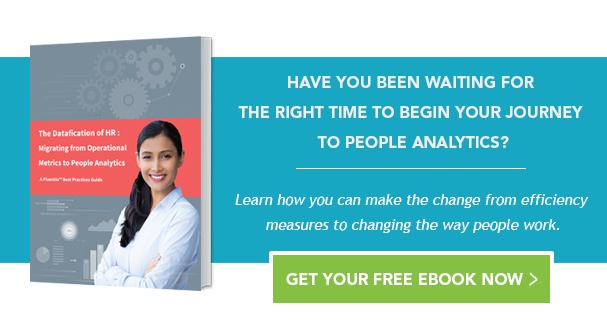
For about ten years, the business intelligence industry has been urging HR leaders to adopt big data and predictive analytics. BI developed tools for data scientists and power users, and the prevailing consensus seemed to be that HR should develop the capability to use those tools.
In early 2015, Bersin by Deloitte described analytics in HR as “stuck in neutral.” At the beginning of 2016, the New Talent Management Network described the function as “still under construction,” while Bersin was excited that the ability to gain value from predictive analytics doubled to 8 percent of organizations.
The reasons why HR lagged other business functions depended on perspective. Business leaders complained about HR’s lack of business acumen. BI vendors and data scientists pointed to a lack of analytical skills. IT cited a lack of resources. Consultants blamed a lack of knowledge and organizational silos.
Yet, 2016 was a year of growth as “people analytics” emerged as a business discipline. Bersin evaluated the rapid increase in capability in a July 2016 report on the analytics market, showing organizations making strides in understanding the relationship between people and performance (Figure 1).

We can attribute the advances in analytics in HR to competitive pressure, industry hype, or management, but changes in technology have been an important factor. The analytics industry and HR software vendors have revolutionized the way they deliver business intelligence.
Analytics are moving away from the old IT-centric model, where reports are a product, to a service model. Companies embed reporting and analytical tools directly in the applications where people work. Dozens of cloud business intelligence platforms sprang up, and it seems we see a new entrant into the market every week.
Agile niche companies like Birst, TIBCO, Domo, Salesforce, and Platfora have joined established vendors like Tableau, SAS, and Microsoft to provide user-friendly embedded reporting and analytics functions in the business applications people use in their everyday work.
Some HCM vendors build or buy their reporting solutions. Others partner with analytics companies to provide branded or co-branded solutions. Here are three examples of the various approaches to analytics.- Workday partnered with Hadoop-based Platfora on several major projects and is now acquiring that company to build out its analytics capability.
- SumTotal partners with TIBCO’s Jaspersoft to provide its branded SumTotal Advanced Reporting and offers Jaspersoft Studio for customers who want to create more robust integrated solutions.
- SuccessFactors uses open-source BIRT to provide its analytics solutions.
Instead of HR moving into analytics, analytics has moved into HR. Vendors are in a heated competition to deliver tools that include graphical interfaces and natural language data search. Instead of hiring developers to create complicated SQL queries, users can select their data sources, set up their own models, and prepare their data to create visualizations in hours or days instead of weeks or months.
Embedded analytics are not a panacea. Business users need reporting tools in their applications. Power users need to connect data for self-service modeling. Data scientists need the ability to explore data with advanced statistical models. These requirements must be balanced with the need for organization-wide data governance.
Much of the information HR needs to demonstrate the value of people to the organization exists outside of HR. Embedded analytics can’t be allowed to exist in isolation from other data sources, but merely connecting systems isn’t the answer. If your organization has not yet created a master data management and governance effort, we recommend you get started right away. Any delay only means that the issue of data proliferation will become more complicated before you get a handle on it.
PhenomᵉCloud is a comprehensive technology solutions provider committed to empowering businesses to overcome challenges, enhance their workforce capabilities, and achieve superior outcomes.


Leave a Comment